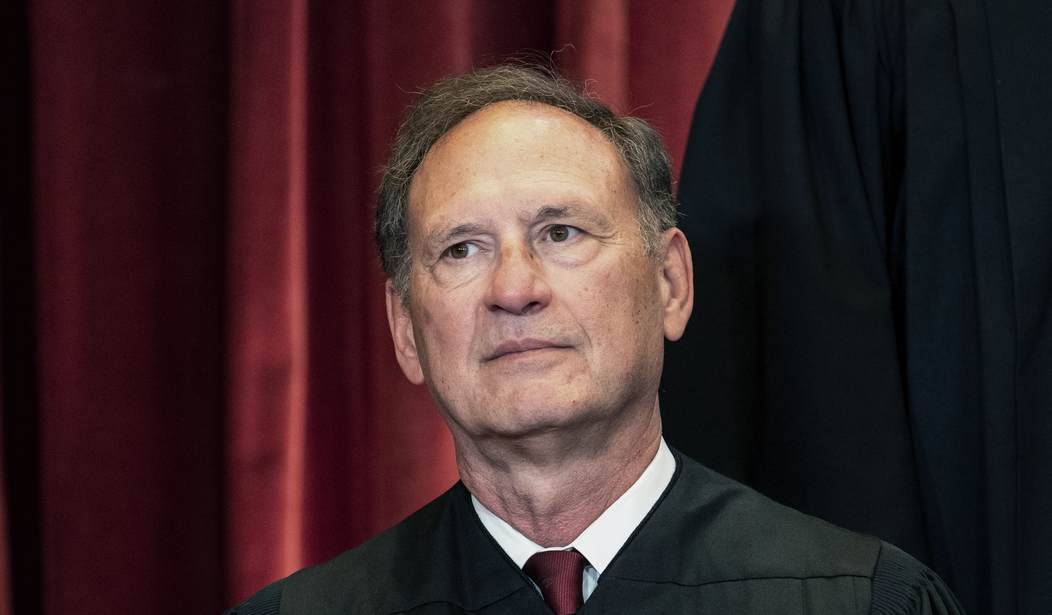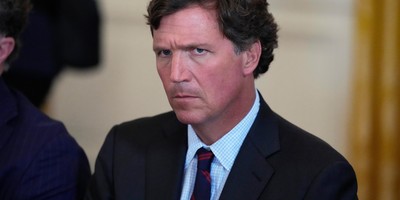Democrats have become increasingly vocal in their vitriol against the current U.S. Supreme Court. Earlier this month, they introduced legislation looking to impose a set of "ethics" on the Court. At least one justice isn't staying silent against these attacks on the institution, though. Last Friday, the Wall Street Journal published an interview with Justice Samuel Alito as an opinion piece, referring to him as "the Supreme Court’s Plain-Spoken Defender."
Early on, the piece recaps the many attacks against the Court in recent years, including concerns from the Left about supposed "ethics" scandals, as one of the ways in which the Court has been in the news. Alito is then quoted for how he has to defend himself:
By comparison with the previous eight decades or so, the court has frequently declined to defer to elite political opinion, and as a result it has made news in other ways. A draft abortion opinion was leaked to the press. An armed man was arrested outside the home of Justice Brett Kavanaugh and charged with attempted assassination. The justices have come under attack from President Biden (“this is not a normal court”) and Democratic lawmakers. Partisan journalists have tried to gin up “ethics” scandals and incite animus against disfavored justices.
“I marvel at all the nonsense that has been written about me in the last year,” Justice Samuel Alito says during an early July interview at the Journal’s New York offices. In the face of a political onslaught, he observes, “the traditional idea about how judges and justices should behave is they should be mute” and leave it to others, especially “the organized bar,” to defend them. “But that’s just not happening. And so at a certain point I’ve said to myself, nobody else is going to do this, so I have to defend myself.”
He does so with a candor that is refreshing and can be startling...
Townhall spoke with Curt Levey, a constitutional law attorney and the president of the Committee for Justice, who offered his thoughts on Alito's interview and what they mean for the Court. Not only did Levey agree with the justice at length, but also echoed the piece referring to Alito as having "candor."
Recommended
"Alito notes that there was a time when judges could be mute because they could count on the organized bar to defend them. The sad truth is that the bar and the mainstream media can no longer be counted on to respond to below-the-belt attacks on conservative judges. Hence, Alito’s conclusion that 'nobody else is going to do this, so I have to defend myself,'" Levey offered.
As Levey also put it, "Justice Alito spoke with remarkable frankness and the points he made were right on the money," including when it comes to imposing an ethics code on the Court.
The idea of a scandal over "ethics" finds its way in the piece once more, to close the piece, with Alito's remarks in that regard earning headlines from the mainstream media and attention from outraged leftists who already regard the Court as illegitimate. Emphasis is added:
The attacks on the court are sure to keep coming as well. Last week the Senate Judiciary Committee voted along party lines to advance Sen. Sheldon Whitehouse’s Supreme Court Ethics, Recusal and Transparency Act, which purports to impose on the justices and their clerks regulations “at least as rigorous as the House and Senate disclosure rules.”
Justice Alito says he voluntarily follows disclosure statutes that apply to lower-court judges and executive-branch officials; so do the other justices. But he notes that “Congress did not create the Supreme Court”—the Constitution did. “I know this is a controversial view, but I’m willing to say it,” he says. “No provision in the Constitution gives them the authority to regulate the Supreme Court—period.”
Do the other justices agree? “I don’t know that any of my colleagues have spoken about it publicly, so I don’t think I should say. But I think it is something we have all thought about.”
The political branches have other weapons they could deploy against the court. The Constitution doesn’t specify the number of justices, so Congress could pack the court by enacting legislation to expand its size. Last week a pair of leftist law professors issued an “open letter” urging President Biden to “restrain MAGA justices” by applying their rulings as narrowly as possible. The day the court decided Biden v. Nebraska, striking down Mr. Biden’s student-loan forgiveness plan, the president announced that he was undertaking legally questionable alternatives.
Justice Alito wonders if outright defiance may be in the offing for the first time since the aftermath of Brown v. Board of Education (1954): “If we’re viewed as illegitimate, then disregard of our decisions becomes more acceptable and more popular. So you can have a revival of the massive resistance that occurred in the South after Brown.”
Alito acknowledges that it is "a controversial view" to say that Congress cannot regulate the Court. It is a principled view though, as he's pointing to the Constitution.
"Alito did not shrink from pointing out that Congress cannot constitutionally impose an ethics code on the Supreme Court," Levey offered about such remarks. "Alito acknowledged that it 'is a controversial view,' but of course he knows that it should be no more controversial than the indisputable statement that the Court may not impose an ethics code on Congress. Both are equal and independent branches of the federal government."
Levey also emphasized Alito's bluntness, noting "Justice Alito should be admired for putting blunt honesty above avoiding controversy and for sticking to his principles even when it would be far easier to go with the flow." He added that the justice "was equally blunt about the consequences of the Left’s recent attacks on the legitimacy of the Court" when it comes to pointing to the Brown v. Board of Education case.
Republicans on the Senate Judiciary Committee not only voted against the legislation as it passed out of Committee on partisan lines, but had warned that it doesn't have a chance of passing. "Dead as fried chicken," is how Sen. John Kennedy (R-LA) referred to it in a press conference. The legislation does not seem likely to pass in the Senate when it needs 60 votes to do so.
Republicans Work to Block Democrats' Latest Attacks on the Supreme Court https://t.co/f8Dx6U51ob
— Townhall.com (@townhallcom) July 20, 2023
But that was only one part of the interview. Alito provides invaluable insight into his fellow justices, especially fellow conservatives. Further, Alito also speaks to how votes break down along ideological lines:
On the liberal side of the court, by contrast, “I don’t see that there’s a difference in interpretive method,” Justice Alito says. Yet he emphasizes that “we don’t always line up 6-3, 5-4, the way some people tend to think. If you look at all the cases, there are cases where the lineup is unusual.” Chief Justice Roberts wrote two election-law decisions this term, Allen v. Milligan and Moore v. Harper, in which he was joined by the three liberals and Justice Kavanaugh, along with Justice Amy Coney Barrett in the latter case
It's Alito's remarks about the liberal justices which Levey said he "found most interesting," pointing out that this contrasts with the differences Alito discussed more at length when it comes to his fellow conservatives. "That’s a polite way of saying that the Court’s three liberals largely march in ideological lockstep, while the conservative justices take a more independent approach," Levey also shared, adding "statistical analyses of the Court’s decisions bear this point out."
Then there's how the Dobbs v. Jackson case overturned Roe v. Wade, which imposed legalized abortion throughout the country, and Planned Parenthood v. Casey, which upheld the Roe decision. A popular refrain from pro-abortion advocates has been to hysterically decry precedent. But Alito's remarks on Dobbs offer a fitting rebuttal to that:
Justice Alito’s respect for precedent has limits: “Some decisions—and I think that Roe and Casey fell in this category—are so egregiously wrong, so clearly wrong, that’s a very strong factor in support of overruling.” Those are the 1973 and 1992 abortion cases that Dobbs overturned, with Justice Alito writing for a majority of five. Chief Justice Roberts provided a sixth vote to uphold Mississippi’s 15-week abortion ban but urged “a more measured course” that would narrow the precedents while deferring the question of whether to overturn them altogether.
As this piece mentions, Alito also spoke to the Wall Street Journal in prior months, including when he offered he had an idea who had leaked the Dobbs draft opinion in May of last year, which he had authored.
Almost a Year After Dobbs Leak, Justice Alito Shares His Thoughts
— Townhall.com (@townhallcom) April 29, 2023
https://t.co/t4wwvl5IAh

























Join the conversation as a VIP Member